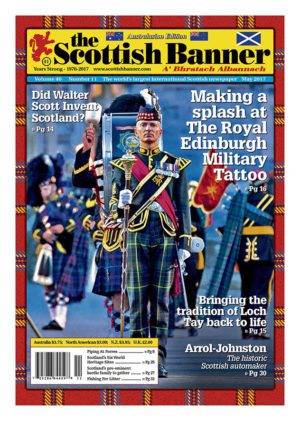
May 2017 (Vol. 40, Number 11)
The Banner Says…
The Good Old Days?
If you are anything like me, you are fascinated by the “good old days”. That bygone era, when the horse and carriage clip-clopped along cobbled streets. The old lamp lighter doing his rounds each evening, lighting the streets with the pale, yellow of the flickering gas lamps. Inside the houses, wasp waisted women scurried off to the kitchen while their stern faced men drank port in the front room – all part of another world.
Pandora’s Box
My love for that era is so strong, that when an early copy of the Glasgow Herald arrived in the office, everything was dropped while it was read from cover to cover. The date on the yellowed pages was Thursday, July 15th, 1915. The news it carried brought that long-ago summer’s day into the present. I was surprised to notice that, in contrast to today’s papers, the front page was entirely taken up with the classified advertising section, which offered what seemed to be a Pandora’s Box full of bargains.
Take for instance the eight cylinder Cadillac at £495 – complete. Billed as a ‘revelation to the man who has never been satisfied with anything short of excellence‘, it seemed a steal at the price. Also under the heading, “Automobiles for Sale”, was the Seabrook, two seater, 10 horsepower.
The situations vacant offered some interesting positions. One bookkeeping post, for instance stressed that the applicant was not to be under the age of 40 years. That’s a switch! An apprentice fitter was wanted to start immediately, with a salary of 1 penny and three farthings per hour.
Meanwhile a head sales girl at the Co-operative store was earning 25 shillings a week. However, that position required a £10 security deposit.
The First World War
The hard core news was on the inside, and turning here gave us a peek into another world! That of the First World War. There were horrifying stories of war torn Belgium, where thousands were left homeless and starving. It also told of the plight of those in the trenches.
A particularly moving piece by one, Rev. Muir, of Auchterauder in Perthshire, who at that time was acting as Chaplain to the 2nd Royal Scots stationed in Flanders, He, apparently said; “Journeys in the gathering darkness bring home to one as nothing else does, all the strategy and pathos of war. With no light whatever, we stole through sleepy villages, after passing ambulances with their tender burden. One of these carried my thoughts briefly beyond this fighting, for it bore the sweet legend, Maid of Perthshire. We arrived at the village school, which had now been turned into a hospital as the first of the wounded were arriving. As those poor bandaged fellows came into the light, their faces grimy with the smoke of battle, and their khaki clayed with mud from the trenches, many would have liked to take them, one by one, to mother them back to health again. Those in the trenches had rain mud, and shells as their constant companion.”
Glimpse into yesterday
But in other parts of the world, Britain’s fighting men had another kind of hell to contend with. In Gallipoli it was the heat – and the flies. “Those pests’ filled tents and shelter with their idiot buzzing. They would batten onto the unburied dead and pester the living by lighting on their faces and hands. They would wake humans in the morning by crawling all over them. They rise up in the road before them in great clouds. All the food was black with them, even on the fork which goes into your mouth”. Alongside these reports were numerous columns filled with names and headed, Killed in Action.
Back on the home front, Fraserburgh, Aberdeenshire had just had a new lifeboat presented to them by one, Mr. T.D. Dyer Edwards. The gift was a thank you for the saving of his daughter Lady Rothers, on the occasion of the Titanic disaster. In Scotland the supplies of meat were small and not nearly keeping up to demand. Top prices for best Scottish and Irish lamb were one shilling a pound while the best quality mutton cost 11 pence.
Reading through the pages, showed me a hard world where victory was everything. Nevertheless, Britain reigned supreme and intended to stay that way at all costs. I am sure there was a lighter side to life in those far off days, but after my glimpse into yesterday, I was glad I was able to come back to today.
And speaking of cars and lifeboats, this month we feature the first ever Scottish car company, on the water we learn about the first commercial boat to operate on Loch Tay since WWII along with how local Scots fishermen are helping clean up the waters and help protect this important industry. In this issue also we chat to Brigadier David Allfrey from The Royal Edinburgh Military Tattoo and as May is Whisky Month in Scotland so we raise a glass to the nation’s “water of life”. Slàinte mhath (good health)!
